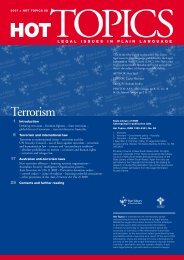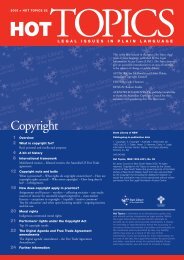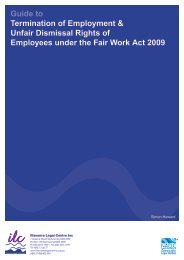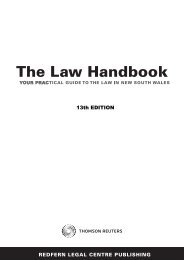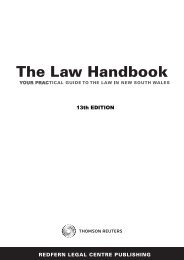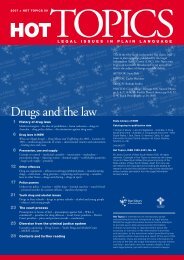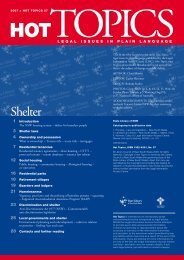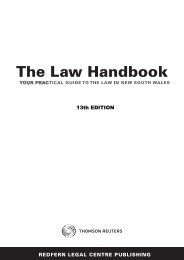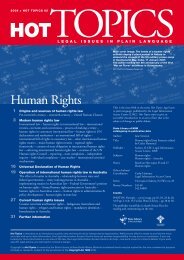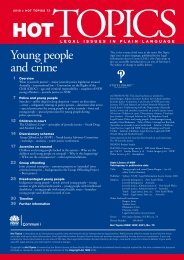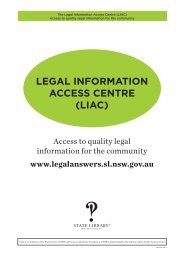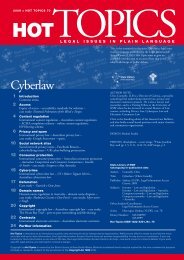Hot Topics 64 - Health and the Law - Legal Information Access Centre
Hot Topics 64 - Health and the Law - Legal Information Access Centre
Hot Topics 64 - Health and the Law - Legal Information Access Centre
Create successful ePaper yourself
Turn your PDF publications into a flip-book with our unique Google optimized e-Paper software.
case sTudY: scHiaVO<br />
On February 25, 1990, Terri Schiavo suffered<br />
brain damage after a myocardial infarction (‘heart<br />
attack’), possibly caused by a chemical imbalance<br />
resulting from an eating disorder. This left her<br />
in what was clinically diagnosed as a ‘persistent<br />
vegetative state’. Her husb<strong>and</strong>, Michael, was<br />
appointed her legal guardian, <strong>and</strong> in 1993 was<br />
awarded one million dollars in a malpractice<br />
lawsuit against physicians who failed to diagnose<br />
<strong>and</strong> treat <strong>the</strong> eating disorder. In 1998, Mr Schiavo<br />
filed a petition with <strong>the</strong> court to discontinue his<br />
wife’s feeding tube, a request that her parents,<br />
Mr <strong>and</strong> Mrs Schindler, devout Catholics, opposed.<br />
The parties were involved in more than 25 court<br />
rulings <strong>and</strong> interventions over a period of ten<br />
years, as a result of which <strong>the</strong> feeding tube was<br />
twice been removed <strong>and</strong> reinserted. Contentious<br />
issues concerned whe<strong>the</strong>r Terri made an advance<br />
directive <strong>and</strong> who had <strong>the</strong> ultimate authority to<br />
withdraw futile treatment from her.<br />
Late in March 2005 her doctor, following <strong>the</strong><br />
order of a Florida Supreme Court judge, removed<br />
<strong>the</strong> feeding tube that had been keeping Schiavo<br />
alive for 15 years, despite <strong>the</strong> extraordinary,<br />
last-minute efforts of Republican congressional<br />
leaders to extend her life by issuing a subpoena<br />
for her to give testimony before <strong>the</strong>m.<br />
At a midnight sitting in March 2005 <strong>the</strong> uS<br />
Congress voted to order a federal court to<br />
review <strong>the</strong> case. The legislation gave <strong>the</strong> parents<br />
st<strong>and</strong>ing in federal court, though it did not compel<br />
a federal judge to take up <strong>the</strong> case. On 21 March<br />
2005, uS president Bush issued <strong>the</strong> following<br />
public statement:<br />
‘Today, I signed into law a bill that will allow<br />
Federal courts to hear a claim by or on behalf of<br />
Terri Schiavo for violation of her rights relating<br />
to <strong>the</strong> withholding or withdrawal of food, fluids,<br />
or medical treatment necessary to sustain her<br />
life. In cases like this one, where <strong>the</strong>re are<br />
serious questions <strong>and</strong> substantial doubts, our<br />
society, our laws, <strong>and</strong> our courts should have a<br />
presumption in favor of life. This presumption<br />
is especially critical for those like Terri Schiavo<br />
who live at <strong>the</strong> mercy of o<strong>the</strong>rs. I appreciate <strong>the</strong><br />
bipartisan action by <strong>the</strong> Members of Congress<br />
to pass this bill. I will continue to st<strong>and</strong> on <strong>the</strong><br />
side of those defending life for all Americans,<br />
including those with disabilities.’<br />
The uS Supreme Court refused to hear an<br />
emergency appeal by <strong>the</strong> Schindlers, <strong>and</strong> Terri<br />
died on 31 March 2005, aged 41, nearly two weeks<br />
after doctors removed her feeding tube.<br />
The Schiavo case represents an unprecedented<br />
legislative involvement in individual end-of-life<br />
clinical decision making. It is difficult to imagine<br />
<strong>the</strong> professional <strong>and</strong> social consequences of<br />
making such intervention routine. Criticisms that<br />
<strong>the</strong> legislative action in this instance is <strong>the</strong> result<br />
of a broader agenda on <strong>the</strong> human right to life <strong>and</strong><br />
<strong>the</strong> political role of its religious proponents must<br />
be taken seriously by clinicians.<br />
united States Court of Appeals decision of 23 March<br />
2005 available at http://www.ca11.uscourts.gov/opinions/<br />
ops/200511556.pdf<br />
that is apparently ‘futile’ should be continued, <strong>the</strong> issue<br />
is best discussed before <strong>the</strong> Hospital’s Clinical Ethics<br />
Committee. Ultimately, if such disagreement persists,<br />
a declaration to lawfully withdraw treatment may have<br />
to be obtained from a Court. If <strong>the</strong> relatives continue<br />
to dispute a withdrawal of treatment decision, <strong>the</strong>n<br />
relevant doctors should specify that as a reason for not<br />
signing <strong>the</strong> death certificate. This will <strong>the</strong>n activate <strong>the</strong><br />
jurisdiction of <strong>the</strong> coroner.<br />
‘No CPR’ (cardio-pulmonary resuscitation) orders may<br />
be written in consultation with a terminally ill patient<br />
<strong>and</strong> <strong>the</strong> patient’s family, in accordance with hospital<br />
guidelines, to avoid <strong>the</strong> indignity of life ending in<br />
<strong>the</strong> pressure of an emergency attempt at CPR. This<br />
might possibly involve deep chest compressions, cardiac<br />
‘shocks’ with a defibrillator, <strong>the</strong> insertion of intravenous<br />
cannulae <strong>and</strong> giving of drugs such as adrenaline.<br />
One important issue that Justice Howie discussed<br />
in <strong>the</strong> Messiha case was whe<strong>the</strong>r resource restriction<br />
(pressure for beds) should ever be mentioned to relatives<br />
in discussions of end of life treatment. Certainly to do<br />
so seems to indicate an erosion of <strong>the</strong> primacy of <strong>the</strong><br />
patient’s reasonable prospects of return to a meaningful<br />
quality of life as <strong>the</strong> decisive principle. The courts have<br />
preferred not to get involved in cases of resource rationing<br />
because <strong>the</strong>y are not in possession of a political m<strong>and</strong>ate,<br />
nor do <strong>the</strong>y have <strong>the</strong> professional knowledge to make<br />
such decisions. The only situation where a court might<br />
become involved is where <strong>the</strong>re has been unfairness or<br />
illegality in <strong>the</strong> decision-making process (for example,<br />
racial discrimination). Yet, pressure of scarce resources<br />
as a result of rationing of government health expenditure<br />
are an inevitable social justice background to such<br />
decisions, that filters down to intensive care specialists<br />
for whom it often reluctantly becomes a matter of<br />
trading lives in pressured clinical deliberations. The<br />
question <strong>the</strong>n arises whe<strong>the</strong>r a Schiavo type ‘extreme’<br />
case could arise in Australia.<br />
Futile treatment is a notoriously controversial concept<br />
which has proven almost impossible to define.<br />
Disagreements still arise as to what level of probability<br />
of success one chooses before saying a treatment is<br />
technically ‘futile’ in <strong>the</strong> sense of, on <strong>the</strong> best available<br />
End of life issues 15



